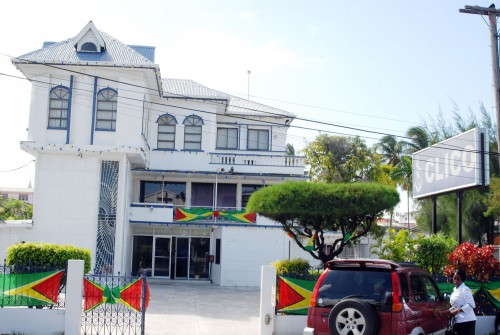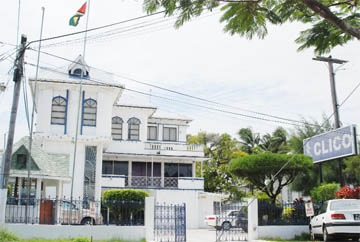Big companies should not be allowed to run small countries
By Professor Norman Girvan
The drama over the CL Financial debacle continues. Contending accounts are being offered of what happened, and why. And different assessments are being made on the merit of the rescue package put together by the Trinidad and Tobago government.

In his statement at the Press Conference on January 30, Mr Ewart Williams, Governor of the Central Bank, was at pains to emphasise that CL Financial’s problems are not fundamentally attributable to the effects of the global financial crisis. In this, he contradicted Mr Duprey’s own explanation (in a press interview).
The Minister of Finance, Mrs. Karen Nunez-Tesheira, conceded that regulation of insurance companes was inadequate, but appeared to place some of the blame on the global financial crisis when she said that it gave special urgency to revision of the regulatory environment.
According to the Governor, the fall in methanol prices and decline in real estate values associated with global crisis were, at best, just triggers. They would hardly have posed problems for CL Financial had these operations not been linked to its financial companies within a conglomerate that followed highly questionable financial practices.
The Governor’s statement identified three such practices. In his own words: (i) ‘excessive related-party transactions which carry significant contagion risks’; (ii) ‘an aggressive high interest rate resource mobilization strategy’, and (iii) ‘a very high leveraging of the Group’s assets’.

The Governor made it clear that the Central Bank had concerns on these practices since 2004. He says ‘the Central Bank has consistently focused on these deficiencies but has been stymied by the inevitable challenge of change and by inadequacies in the legislative framework which do not give the Bank the authority to demand these changes’ (my emphasis).
The logical question is why no action was taken by the government since 2004 to address these legislative inadequacies.
Indeed, at a public forum on the effects of the global financial crisis held on the UWI campus back in October 2008, the audience was assured by senior figures in the public and private sectors that ‘it can’t happen here’.
Exposure to sub-prime assets was minimal, we were told; and the regulatory environment for the financial sector was adequate, or being addressed.
Trinidad and Tobago was, after all, seeking to become the financial capital of the Caribbean.
Yet, as we now know, at the time of that forum the Central Bank had been concerned about CL Financial’s practices for at least four years. Practices which had the potential of triggering a wider financial meltdown; and which the Central Bank was legally impotent to change.

So why were the laws not changed before? (the legislative changes were rushed to Parliament three days after the Press Conference).
The answer seems to take us to the heart of governance issues in small countries, where a single large firm can wield enormous political and economic influence, to the detriment of the public good.
The costs of inadequate regulation, in the case of the CL Financial debacle, are quite impressive.
The actual cost to the government is not yet known. In Parliament on Monday, the Prime Minister indicated that the deficit in the Statutory Fund of CLICO and British American Insurance is between $7 and $8 billion (TT). A portion of this is to be financed by sale of CL Financial assets. At this point, no one is prepared to estimate the balance that the government has undertaken to make good.
To set the $8 billion figure in context, it is the equivalent of about 18% of the revised T&T budget for the current year ($43.9 billion). In the United States, this would be the equivalent of US$602 billion (18% of the 2009 federal budget of $3,304 billion).
US$602 billion is over seven times the bailout package for AIG; and almost as much as the entire TARP package passed last October.
TT$8 billion is also the equivalent of 46% of the value of the Heritage and Stabilisation Fund as at September last; and the equivalent of 14% the value of T&T’s net official reserves at the end of November 2008.
Besides the financial cost to the state, whatever these might turn out to be; there are indirect costs. The debacle has sent shock waves throughout the Caricom Caribbean, in countries like Barbados, St Lucia and Guyana, where CLICO has operations. CL Financial is said to control over TT$100 billion in assets in 28 companies regionally and globally.
A major blow has been dealt to public confidence in the financial system, in Trinidad and Tobago and throughout the region.
There can be no doubt that the T&T government did the right thing. A continued run on CL Financial’s financial companies would almost certainly have triggered a major liquidity crisis, leading to run on other banks and deposit taking institutions.
The downward spiral would have spread to the real economy, as credit dried up.
Notably, the T&T goverment has conditioned its support on measures which address precisely the concerns identified by the Central Bank in its monitoring since 2004. These are set out in the MOU.
The core of the conglomerate has been, in effect, broken up. CLICO Investment Bank’s licence has been revoked and it is to be closed down. CL Financial will lose ownership of the methanol company and of Republic Bank. It has lost operating control over CLICO and British American Insurance. Its ownership in both has been diluted, and the Boards and management of both will be restructured.
Both companies are to be returned to their core insurance business.
The assets taken out of CL Financial’s control represent a reported $38 billion, more than one-third of the conglomerate’s assets—and presumably at the heart of its leveraging.
The MOU also expressly prohibits intercompany transactions within CL Financial group.
Monthly progress reports to the Central Bank are required. This addresses a sore point—the limited information hitherto available from CL Financial, a privately owned company.
This is indeed a high price. I am not even sure if it qualifies as a ‘bail-out’. (Mr Duprey, understandably, would have preferred a line of credit, and is reportedly considering taking legal action to force the government to use this option and to overturn the terms of the MOU.
But given the high, and as yet unknown, cost of the rescue package to the taxpayer, and the reasons why it became necessary, the terms in the MOU seem appropriate.
This affair is by no means over. But already we can see several lessons to be learnt.
The first is that big companies should not be allowed to run small countries (the term is taken from the English economist, Dudely Seers, who wrote an article with a similar name over 40 years ago. He was referring to multinational corporations. But he could have been talking about our local conglomerates, of which CL Financial, whose four core companies control assets the equivalent of over 25% of the Trinidad and Tobago GDP, is not the only one).
If they are allowed to, then it is the ordinary citizen who, all too often, ends up picking up the bill.
Second, there is no substitute for adequate monitoring and supervision and muscular enforcement of appropriate regulations. The costs of laxity and delay can be considerable. Jamaica found this out in the 1990s, and is still paying the price for its own financial sector bail-out, over 10 years later, in the burden of domestic debt the government is carrying.
Third, regulation should be regional and seamless; so that regional conglomerates cannot evade regulations in one country by exploiting loopholes in another (‘regulatory arbitrage’).
Caricom has had a Draft Investment Code and Draft Financial Services Agreement in existence for many years; negotiated painstakingly by officials as part of CSME implementation. They need to be finalised and adopted as a matter of urgency.
And fourth, we need to revisit the commitments made under the Economic Partnership Agreement (EPA with the EU. Commitments include liberalisation of current and capital account movements with the EU and the Dominican Republic, commitments on access to the financial services industries and commitments on the regulatory environment for financial services.
Arguments have been made that the EPA provisions limit the policy instruments available to Caricom governments to protect local economies from the effects of the crisis on their economies; and that the regulatory provisions are influenced by EU standards, standards that have been shaped by the influence of the US investment banking giants, three of which have since collapsed.

